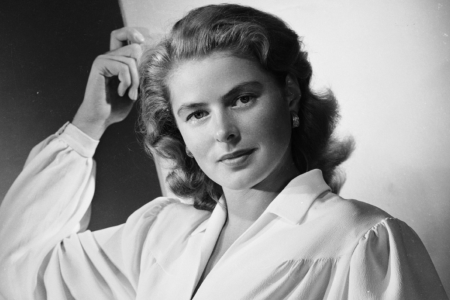Ingrid Bergman
Ingrid Bergman, born on August 29, 1915, and passing away on August 29, 1982, was a renowned Swedish actress whose illustrious career spanned five decades. Regarded as one of the most influential figures in cinematic history, Bergman garnered widespread acclaim, clinching numerous prestigious awards, including three Academy Awards, two Primetime Emmy Awards, a Tony Award, four Golden Globe Awards, a BAFTA Award, and a Volpi Cup. She stands as one of only four actresses to have secured at least three acting Academy Awards, with Katharine Hepburn being the sole recipient of four. In 1999, the American Film Institute honored Bergman as the fourth greatest female screen legend of Classic Hollywood Cinema.
Born in Stockholm to a Swedish father and a German mother, Bergman initiated her acting journey in Swedish and German films. Her introduction to American audiences came through the English-language remake of “Intermezzo” (1939). Renowned for her naturally radiant beauty, she immortalized herself in “Casablanca” (1942) as Ilsa Lund. Throughout the 1940s, Bergman delivered captivating performances in acclaimed dramas such as “For Whom the Bell Tolls” (1943), “Gaslight” (1944), “The Bells of St. Mary’s” (1945), and “Joan of Arc” (1948), earning nominations for the Academy Award for Best Actress, with a win for “Gaslight.” Her collaborations with Alfred Hitchcock, including “Spellbound” (1945), “Notorious” (1946), and “Under Capricorn” (1949), further cemented her status as a cinematic icon.
In 1950, Bergman starred in Roberto Rossellini’s “Stromboli,” igniting a scandal in the U.S. due to her affair with Rossellini and her pregnancy prior to their marriage, which prompted her to reside in Europe for several years. During this period, she delivered compelling performances in Rossellini’s “Europa ’51” and “Journey to Italy” (1954), earning the Volpi Cup for Best Actress for the former. Bergman later returned to Hollywood, clinching two additional Academy Awards for her roles in “Anastasia” (1956) and “Murder on the Orient Express” (1974). Noteworthy films from this period include “Indiscreet” (1958), “Cactus Flower” (1969), and “Autumn Sonata” (1978), earning her a sixth Best Actress nomination.
Beyond her film accolades, Bergman triumphed on the stage, winning the Tony Award for Best Actress in a Play for Maxwell Anderson’s “Joan of Lorraine” (1947). She also secured two Primetime Emmy Awards for Outstanding Lead Actress in a Limited Series or Movie for “The Turn of the Screw” (1960) and “A Woman Called Golda” (1982). Despite battling breast cancer discovered in 1974, Bergman continued to grace screens until shortly before her passing on her sixty-seventh birthday in 1982. Proficient in five languages—Swedish, English, German, Italian, and French—Bergman’s transcendent talent resonated across cultures and languages alike.
The use of images or names herein does not necessarily imply any form of management or representation or that The Celebrity Group was wholly responsible for a specific endorsement. The Celebrity Group works in partnership with many agents & managers for the supply of celebrities not represented by ourselves.



